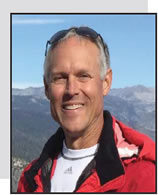VOLUME 28, ISSUE 1
ANESTHESIA IN DEVELOPING COUNTRIES

Keller Matthews, MD
A colleague, who knew that I had visited Central America numerous times, recently asked me about my trips. An irrepressible smile came to my face; I’m still not sure whether I smiled because I had such fond recollections, or thought that he was validating my decision to visit developing countries, or because I knew of the surprises that would inevitably await him, if he chose to go on a trip.
Scanning his face for clues to his curiosity, I rifled through my memory to prioritize which stories to tell. After almost twenty years of going to some Central American destination for a week-long medical trip, I thought I had a story for every occasion.
Arriving on my first trip, to San Salvador, we were treated like celebrities. A press corps wanted photos and video, and our arrival was publicized on the nightly news and on the front page of the next day’s national newspaper. The head of the governmental health ministry was at the hospital the first morning to assure a smooth start. Her tailored business attire contrasted sharply with the simple dresses of mothers waiting in the hallway for their children to have surgery, and reflected the large gap between the working poor and the ruling aristocracy.
Then, her presence, kind smile, attention to those waiting, and expressed gratitude to our visiting team members spoke for all of the people of El Salvador who wanted a better life for those who could not afford it.
The first year I went with the group, I learned of their tradition of culminating fairly long days at work by (sic) dining in restaurants near our hotel. In the foyer, we waited for a cab and met an elite group that was attending a convention in our hotel: the entire flock of finalists for Senorita CentroAmerica. Those were the first twenty of many unexpected reasons that led me to return to Central America. I resolved to dust off the Spanish I learned in my Dallas high school.
I grew up hunting doves, but had not seen automatic weapons until Central America. Leaving the hotel before dawn, soldiers escorted us on our bus to the hospital. I have long considered the short walk between the operating room and PACU to be a risky period, but there I learned that automatic weapons, also, make it safer. More armed soldiers escorted us back to the hotel each evening, and on an afternoon run through the neighborhood adjacent to the hotel, a buddy and I counted fourteen heavily armed private security guards protecting laundromats, hair salons, and quick marts.
I was forewarned about drinking city water in San Salvador, a city of one million people. The most experienced nurse carried intravenous supplies and fluid (pre-9/11) in her carry –on bag, and sure enough, on the way home two team members needed IV hydration therapy. The most knowledgeable and experienced travelers recognized the tropical ailment as one conveyed by the worm in the bottom of tequila bottles.
I first felt an earthquake at 3 AM, before my alarm sounded at 5AM to go to breakfast, before taking the bus to the hospital. Years later, on a trip in Guatemala City, I learned, “There’s an app for that!”, and found that the magnitude, longitude, latitude, and even depth of earthquakes around the globe can be pinpointed within seconds. I also learned that Central America is one of the seismically and volcanically active regions in the world.
I worked in an un-airconditioned hospital in Veracruz, lost oxygen supply one day, and all electricity the next, and yet my most enduring and cherished memories are of the extraordinary physicians, nurses, and support staff who brought their A-game to challenging environments. My experiences have stoked my efforts to continually improve my Spanish fluency, to facilitate donations of medical supplies, and to anticipate problem-solving in resource-poor environments.
I took a week-long course at Oxford about administering anesthetics in developing countries, and realized that my experiences compared favorably with military and NGO physicians in war-torn and natural disaster-stricken countries across the globe. I felt well-prepared by my residency for the challenges of practice, and years later found new challenges by taking my skills to new, medically-meager environments.
I struggle to enumerate the unexpected joys of working in a charitable endeavor. Reimbursement by grateful faces, rather than RVUs, the nostalgia of handwritten records, reunions with team members from previous trips eager to have another go, forging new relationships with strangers welcoming us to do our best, and renewing my awareness of the extraordinary privilege of living and working in a prosperous, developed corner of the world, top my list. I have gratitude for the hundreds of people through the years that I have had the pleasure of working beside to make our big world a little smaller, kinder, and better.

